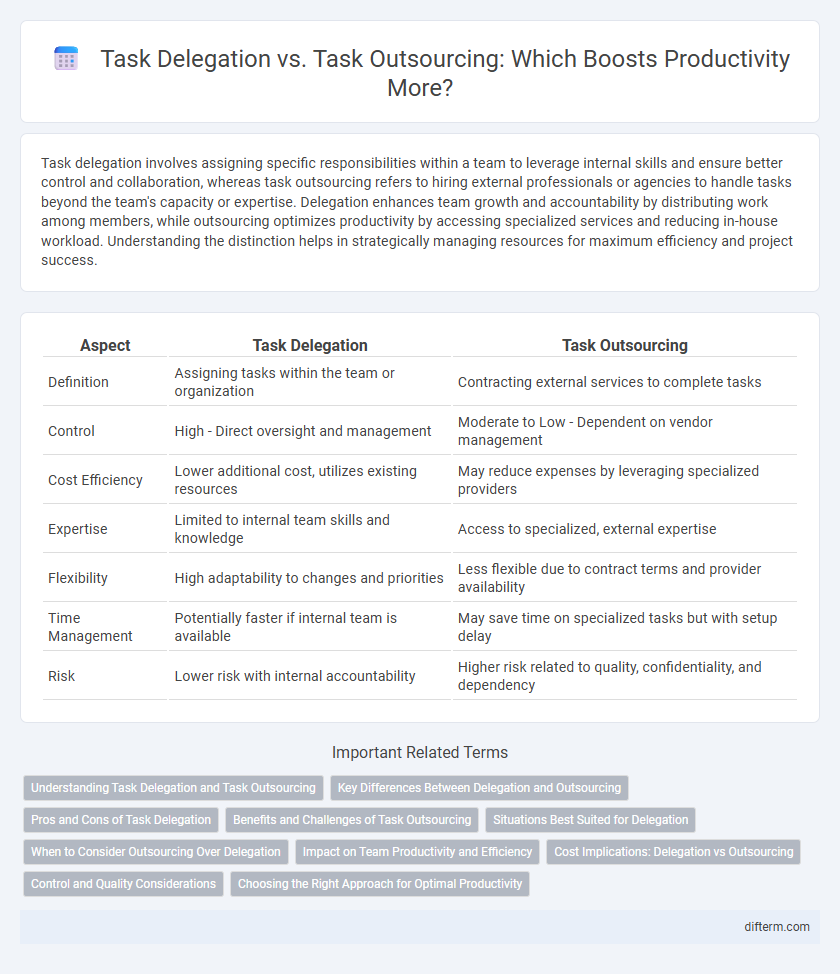Task delegation involves assigning specific responsibilities within a team to leverage internal skills and ensure better control and collaboration, whereas task outsourcing refers to hiring external professionals or agencies to handle tasks beyond the team's capacity or expertise. Delegation enhances team growth and accountability by distributing work among members, while outsourcing optimizes productivity by accessing specialized services and reducing in-house workload. Understanding the distinction helps in strategically managing resources for maximum efficiency and project success.
Table of Comparison
| Aspect | Task Delegation | Task Outsourcing |
|---|---|---|
| Definition | Assigning tasks within the team or organization | Contracting external services to complete tasks |
| Control | High - Direct oversight and management | Moderate to Low - Dependent on vendor management |
| Cost Efficiency | Lower additional cost, utilizes existing resources | May reduce expenses by leveraging specialized providers |
| Expertise | Limited to internal team skills and knowledge | Access to specialized, external expertise |
| Flexibility | High adaptability to changes and priorities | Less flexible due to contract terms and provider availability |
| Time Management | Potentially faster if internal team is available | May save time on specialized tasks but with setup delay |
| Risk | Lower risk with internal accountability | Higher risk related to quality, confidentiality, and dependency |
Understanding Task Delegation and Task Outsourcing
Task delegation involves assigning specific responsibilities to team members within an organization to leverage their skills and improve workflow efficiency, promoting internal accountability and skill development. Task outsourcing refers to contracting external specialists or third-party companies to handle certain tasks, often to reduce costs, increase scalability, and access expertise unavailable internally. Understanding the distinctions between task delegation and task outsourcing enables effective resource allocation, ensuring projects are completed with optimal quality and speed.
Key Differences Between Delegation and Outsourcing
Task delegation involves assigning responsibilities within the organization, leveraging internal resources and employees for accountability and alignment with company culture. Task outsourcing contracts external third-party providers to handle specific functions, often to access specialized skills and reduce operational costs. Key differences include control over work processes, cost structures, and the scope of expertise utilized.
Pros and Cons of Task Delegation
Task delegation enhances team skill development and accountability by assigning tasks to internal members, fostering a collaborative work environment. However, it may lead to uneven workload distribution and potential delays if delegated tasks exceed individual capabilities or resources. Effective delegation requires clear communication and monitoring to ensure productivity gains without compromising quality.
Benefits and Challenges of Task Outsourcing
Task outsourcing enhances productivity by allowing businesses to access specialized skills and reduce operational costs, leading to faster project completion and improved quality. Challenges include managing communication across different time zones and ensuring data security with external partners. Successful outsourcing demands clear contracts and regular performance evaluations to maintain accountability and alignment with business goals.
Situations Best Suited for Delegation
Task delegation is best suited for situations where tasks require team members' specialized skills and internal accountability, allowing managers to leverage existing employee expertise while maintaining control over quality. Delegation is ideal when tasks involve ongoing collaboration, confidentiality, or critical deadlines that benefit from direct oversight within the organization. This approach enhances employee development, boosts motivation, and ensures seamless integration with broader project goals.
When to Consider Outsourcing Over Delegation
Task outsourcing is ideal when specialized skills or advanced technology are required that in-house teams lack, ensuring higher quality and efficiency. Outsourcing also proves beneficial for non-core activities that consume time without contributing directly to strategic goals. When scalability and cost reduction are priorities, outsourcing offers flexibility that task delegation within the organization cannot match.
Impact on Team Productivity and Efficiency
Task delegation empowers team members by assigning responsibilities based on individual strengths, fostering skill development and enhancing overall productivity. In contrast, task outsourcing transfers specific tasks to external experts, enabling the team to focus on core activities and improve efficiency. Balancing delegation and outsourcing strategically can optimize resource allocation, reduce bottlenecks, and drive higher team performance.
Cost Implications: Delegation vs Outsourcing
Task delegation typically involves assigning responsibilities to in-house employees, incurring lower direct costs but potentially increasing indirect expenses such as training and supervision. Outsourcing often requires higher upfront investment due to vendor fees and contractual commitments but can lead to cost savings by leveraging specialized expertise and scalable resources. Evaluating cost implications between delegation and outsourcing is crucial for optimizing budget efficiency and achieving long-term productivity gains.
Control and Quality Considerations
Task delegation maintains greater control and oversight by assigning responsibilities within the existing team, ensuring alignment with organizational standards and culture. Task outsourcing often reduces direct control, relying on external providers which may introduce variability in quality and communication challenges. Evaluating the trade-offs between control and quality is crucial for optimizing productivity outcomes in both approaches.
Choosing the Right Approach for Optimal Productivity
Task delegation involves assigning responsibilities within a team to leverage internal skills and improve efficiency, while task outsourcing entrusts external specialists with specific functions to access expertise and reduce workload. Choosing the right approach depends on factors such as resource availability, cost-effectiveness, and the complexity of the task, ensuring alignment with organizational goals. Effective decision-making in delegation versus outsourcing enhances productivity by maximizing skills utilization and optimizing operational focus.
Task delegation vs Task outsourcing Infographic

 difterm.com
difterm.com